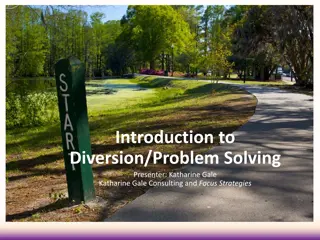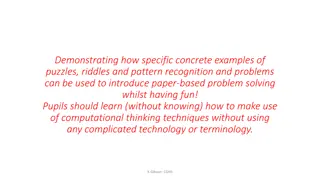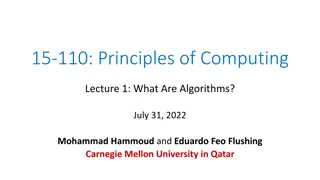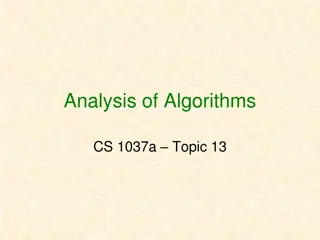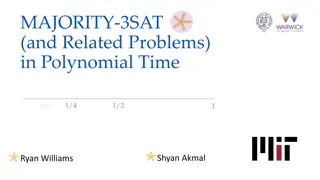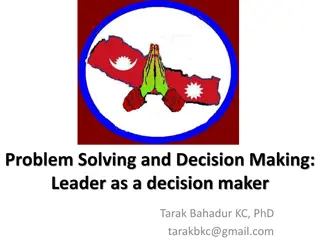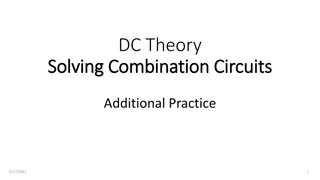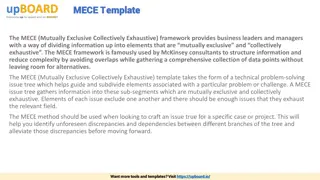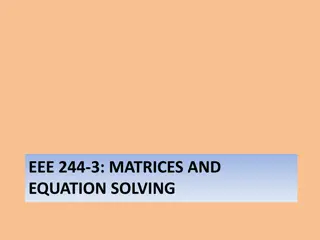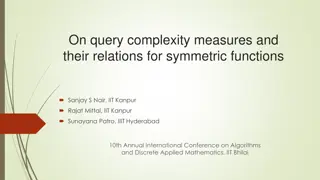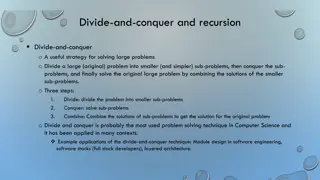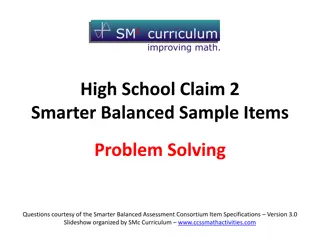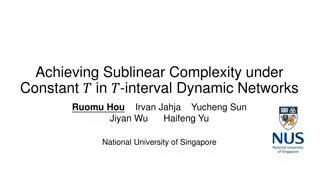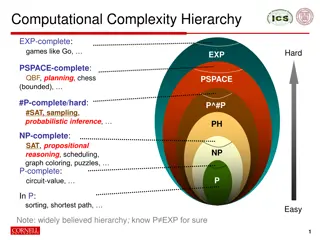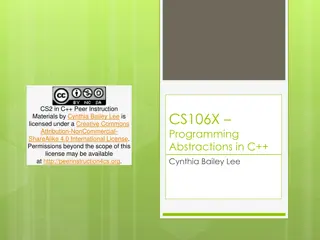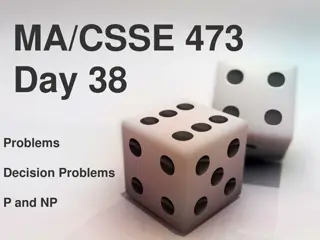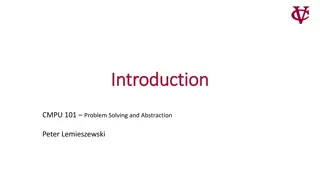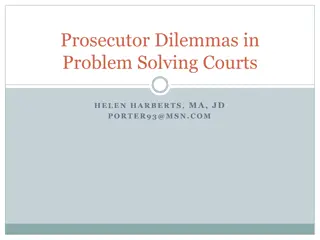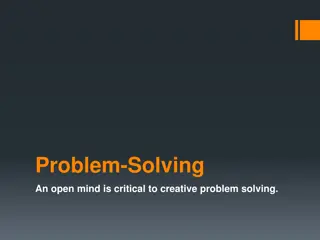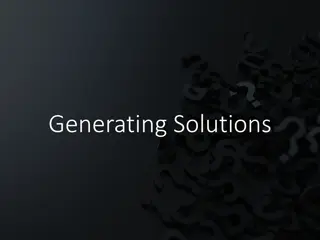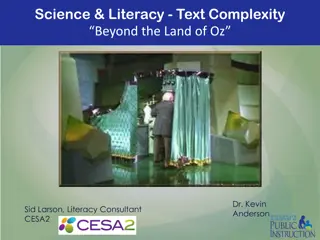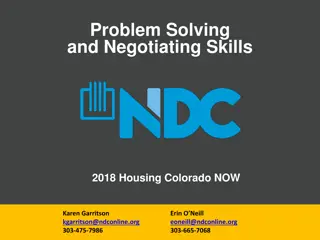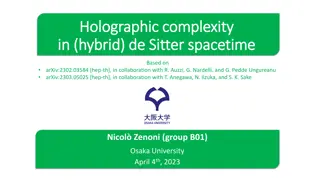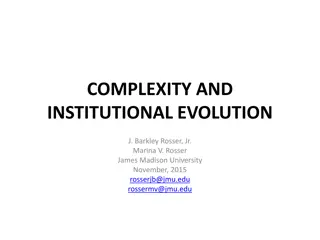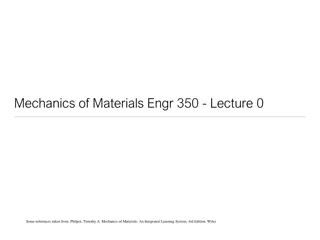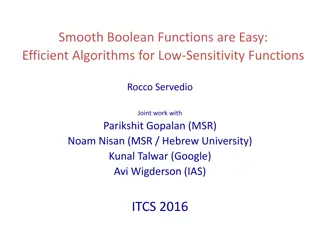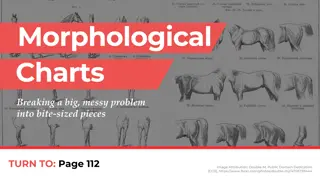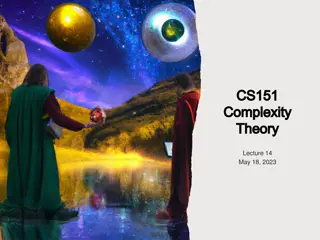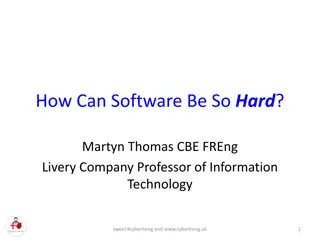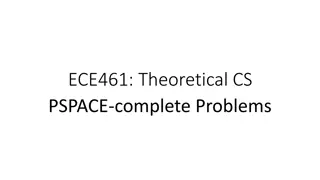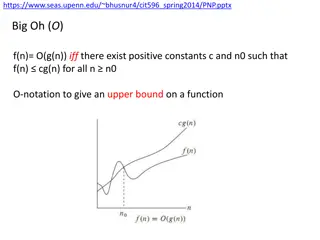Introduction to Problem Solving for Homelessness Prevention
Explore problem-solving strategies to address and prevent homelessness, focusing on rapid resolution and diversion methods. Learn how problem-solving differs from traditional prevention approaches and the benefits it brings to individuals and the system.
1 views • 31 slides
Engaging Paper-Based Problem Solving for Computational Thinking Skills
Implementing paper-based problem-solving activities using puzzles, riddles, and pattern recognition can effectively introduce computational thinking without the need for complex technology or terminology. Through real-life scenarios like transporting a fox, chicken, and corn across a river or encodi
0 views • 23 slides
Solving Problems and Finding Solutions Through Algorithms
Explore the concept of algorithms and problem-solving methods in daily and professional life, illustrated with examples ranging from choosing a meal to creating schedules for courses. Understand the importance of constraints, available knowledge, and requirements when seeking solutions. Learn how to
1 views • 15 slides
Understanding Time Complexity in Algorithm Analysis
Explore the concept of time complexity in algorithm analysis, focusing on the efficiency of algorithms measured in terms of execution time and memory usage. Learn about different complexities such as constant time, linear, logarithmic, and exponential, as well as the importance of time complexity co
0 views • 73 slides
Understanding Complexity in Polynomial Time: MAJORITY-3SAT and Related Problems
Dive into the world of MAJORITY-3SAT and its related problems, exploring the complexity of CNF formulas and the satisfiability of assignments. Discover the intricacies of solving canonical NP-complete problems and the significance of variables in determining computational complexity.
3 views • 35 slides
Mastering the Art of Decision Making: Problem Solving Strategies
Explore the essence of decision making and problem-solving through a comprehensive session outline. Understand the importance, conditions, styles, processes, and ethical considerations in decision making. Learn how identifying problems, finding solutions, and implementing them are crucial steps in t
0 views • 42 slides
Solving Combination Circuits: Practice and Problem-Solving
Explore solving combination circuits through practice exercises and class problem-solving techniques involving equivalent resistance determination, PIER chart application, Kirchhoff's laws, current and voltage analysis, and power dissipation calculations. Enhance your understanding of circuit analys
3 views • 26 slides
Understanding the MECE Framework for Efficient Problem-Solving
The MECE (Mutually Exclusive, Collectively Exhaustive) framework is a powerful tool used by business leaders and consultants like McKinsey to structure information, reduce complexity, and gather comprehensive data without overlaps. It involves creating issue trees that subdivide problem elements int
1 views • 4 slides
Understanding Matrices and Solving Equations in Electrical Engineering
Matrices play a crucial role in solving linear equations in Electrical Engineering applications. Learn about matrix structures, special matrices, inverses, transposes, system of linear equations, and solving methods using MATLAB/Python. Explore the application of matrices in solving voltage-current
1 views • 24 slides
Uninformed Search Chapter 3 - Goal-based Agents and Problem Solving
Discussing goal-based agents and problem solving in artificial intelligence, the chapter covers topics such as representing states and actions, various search algorithms like breadth-first and depth-first search, as well as the problem space principle developed by Allen Newell and Herb Simon. Exampl
2 views • 52 slides
Quantum Query Complexity Measures for Symmetric Functions
Explore the relationships between query complexity measures, including quantum query complexity, adversary bounds, and spectral sensitivity, in the context of symmetric functions. Analysis includes sensitivity graphs, the quantum query model, and approximate counting methods. Results cover spectral
0 views • 19 slides
Divide and Conquer: A Strategy for Problem Solving
Divide-and-conquer is a powerful problem-solving technique in Computer Science where a large problem is divided into smaller sub-problems, conquered individually, and then combined to solve the original problem. Through three steps - Divide, Conquer, and Combine - complex problems can be efficiently
3 views • 18 slides
Understanding Decision Trees in Problem Solving
A decision tree is a crucial tool in problem-solving, providing a systematic way to analyze and make decisions based on inputs. This content explores decision tree concepts, their application in sorting and binary search problems, and practical examples like the nuts-and-bolts matching dilemma. It d
2 views • 20 slides
High School Sample Problem-Solving Questions
Explore sample high school level problem-solving questions involving capacity, pricing, ingredient proportions, and geometry concepts. Test your math skills with real-world scenarios provided in the questions. Practice and improve your problem-solving abilities with these challenging exercises.
0 views • 39 slides
Computational Complexity and NP-Complete Problems
In today's discussion, we delved into computational complexity and the challenges faced in finding efficient algorithms for various problems. We explored how some problems defy easy categorization and resist polynomial-time solutions. The concept of NP-complete problems was also introduced, highligh
0 views • 38 slides
Fun Algebraic Thinking Activities for Learning
Engage in a series of interactive algebraic thinking activities to enhance your problem-solving skills. From true or false equations to solving open sentences, these sponge activities will challenge and strengthen your mathematical reasoning abilities. Explore different identities and test your know
0 views • 27 slides
Achieving Sublinear Complexity in Dynamic Networks
This research explores achieving sublinear complexity under constant ? in dynamic networks with ?-interval updates. It covers aspects like network settings, communication models, fundamental problems considered, existing results, and challenges in reducing complexity. The focus is on count time comp
0 views • 14 slides
Advanced Seminar on Problem Solving Techniques
Explore various problem-solving techniques such as prefix sum, hash, GCD, LCM, and more in this advanced seminar. Learn how to calculate complex mathematical functions efficiently and sort arrays in linear time complexity. Enhance your problem-solving skills and algorithmic thinking.
1 views • 23 slides
Insights into Computational Complexity Hierarchy and SAT Algorithms
The computational complexity hierarchy explores classes of problems like EXP-complete, PSPACE-complete, and more. SAT algorithms, such as local search methods and survey propagation, offer new insights into practical complexity. Discover the interplay between tractable and intractable structures in
0 views • 12 slides
Understanding Complexity Theory in C++
Delve into the world of Complexity Theory with Cynthia Bailey Lee's peer instruction materials on P/NP definitions, decision vs. optimization problems, and the concept of O(2^n) time complexity. Explore the distinctions between problems in P and NP sets, grasp the implications of problem-solving spe
0 views • 27 slides
Understanding Decision Problems in Polynomial Time Complexity
Decision problems play a crucial role in computational complexity theory, especially in the context of P and NP classes. These problems involve questions with yes or no answers, where the input describes specific instances. By focusing on polynomial-time algorithms, we explore the distinction betwee
0 views • 32 slides
Introduction to CMPU 101: Problem Solving and Abstraction
An exploration of Computer Science through the lens of computation, algorithms, and data structures. Discover the essence of problem-solving in the realm of computing, illustrated with examples and definitions from a foundational textbook. Follow a step-by-step guide to computational problem-solving
0 views • 15 slides
Challenges and Innovations in Problem-Solving Courts
Helen Harberts, a skilled MA and JD with expertise in problem-solving courts, delves into the dilemmas faced by prosecutors in these courts. Through in-depth insights and thought-provoking questions, the narrative explores the effectiveness of traditional responses to addiction-based offenses, publi
0 views • 65 slides
The Importance of Problem-Solving Skills in Everyday Life
Developing effective problem-solving skills is crucial as they play a significant role in various aspects of our daily lives, from simple tasks to complex challenges. This article explores the significance of problem-solving, provides strategies like algorithms and heuristics, discusses obstacles en
0 views • 34 slides
Insights into Polynomials Vanishing on Cartesian Products and the 3POL Problem
This joint work explores polynomials vanishing on Cartesian products, focusing on the 3POL problem involving three sets of points and a 6-variate polynomial. It discusses the running time of solving the explicit 3POL problem and compares it to the well-studied 3SUM problem in theoretical computer sc
0 views • 29 slides
Cognitive Problem-Solving Techniques in Everyday Situations
This review touches on various aspects of problem-solving scenarios, including educational philosophies by Lockhart and Kaphur, the Solomon method in hot dog eating contests, the Wright brothers' aviation pioneering, and obstacles like functional fixedness in problem-solving. It challenges readers t
0 views • 8 slides
Enhancing Creativity and Problem Solving Techniques
Explore key outcomes in fostering creativity, identifying and removing blocks to problem-solving, and understanding the process of generating new ideas through concepts like creativity vs critical thinking and block-busting. Learn strategies including brainstorming, defer judgment, and morphological
0 views • 15 slides
Math Problem Solving Challenges and Solutions
Practice your math skills with various problem-solving questions involving decimals, unit rates, ratios, GCF/LCM, percent, and proportions. Explore scenarios like calculating attendance averages, savings goals, change received from purchases, material remaining after cutting, and cost calculations f
0 views • 52 slides
Enhancing Problem-Solving Skills in Mathematics Workshops
In this workshop focused on problem-solving in mathematics, participants engage in various tasks and activities to develop a deep understanding of problem-solving strategies. The key messages emphasize the importance of integrating problem-solving into daily mathematics learning, utilizing multiple
0 views • 34 slides
Understanding Text Complexity in Science and Literacy Education
Exploring the concept of text complexity beyond the familiar realm of Oz, this presentation delves into quantitative and qualitative measures, reader and task considerations, and steps to assess text complexity. Various resources and examples are provided to help educators gauge and improve the comp
0 views • 43 slides
Enhancing Problem-Solving and Negotiating Skills in Deal Structuring
Today's learning objectives focus on recognizing financial and non-financial aspects of problems, negotiating effectively in deals, and creating win-win solutions. Successful deal structuring involves understanding both financial and non-financial factors. The art of problem-solving lies in using fi
0 views • 13 slides
Holographic Complexity in Hybrid De Sitter Spacetime
The research delves into holographic complexity in a hybrid de Sitter spacetime, exploring the AdS/CFT correspondence, quantum information in the bulk, and computational complexity. It also examines the volume of the ERB, evolution of complexity in CFT, and probes cosmological horizons using hologra
0 views • 12 slides
Complexity and Institutional Evolution in Economics
This paper explores the relevance of complexity theory in studying economic institutional evolution, focusing on the concepts of cumulative causation, increasing returns, and hierarchical emergence. It discusses the dynamic and computational complexity theories, highlighting the role of systems foll
0 views • 24 slides
Engineering Mechanics Overview and Problem-Solving Techniques
Explore the fundamental concepts of Engineering Mechanics with references from "Mechanics of Materials: An Integrated Learning System" by Timothy A. Philpot. Learn about approved calculators, problem-solving documentation, free body diagrams (FBDs), and centroids. Enhance your understanding of coord
0 views • 12 slides
Understanding Complexity Measures of Boolean Functions
This work delves into the intricate world of complexity measures for Boolean functions, exploring concepts such as certificate complexity, decision tree depth, sensitivity, block sensitivity, PRAM complexity, and more. It sheds light on the relationships among different complexity measures and provi
0 views • 36 slides
Utilizing Morphological Charts for Problem Solving
Explore the process of breaking complex problems into manageable components using morphological charts. This method helps in generating ideas for solving each sub-problem efficiently. Dive into practical exercises and examples to enhance problem-solving skills.
0 views • 10 slides
Interactive Proofs in Complexity Theory
Delve into the realm of interactive proofs in complexity theory, exploring concepts such as completeness, soundness, and efficiency. Discover how interactive proof systems can be utilized in scenarios like graph isomorphism and their implications on the complexity classes NP and coNP. Uncover the in
0 views • 40 slides
Challenges in Software Development: Understanding the Complexity
Society's dependence on software is increasing, yet many major software projects fail due to factors like late delivery, budget overruns, and changing requirements. Development challenges arise from the inherent complexity of software systems, human factors, and the need for creativity in solving ne
1 views • 30 slides
Understanding PSPACE-Complete Problems in Complexity Theory
This content delves into complexity theory, exploring PSPACE-complete problems and their relevance within the realm of theoretical computer science. It covers concepts such as time complexity classes, P vs. NP dilemma, NP-complete languages, space complexity, PSPACE vs. NPSPACE, and PSPACE completen
1 views • 19 slides
Understanding Big O Notation and Problem Complexity
Big O notation, Omega notation, and Theta notation are used in algorithm analysis to describe upper and lower bounds on functions. They help determine the efficiency and complexity of algorithms in terms of time and space. The content also covers examples of common computational problems like sortin
0 views • 39 slides
